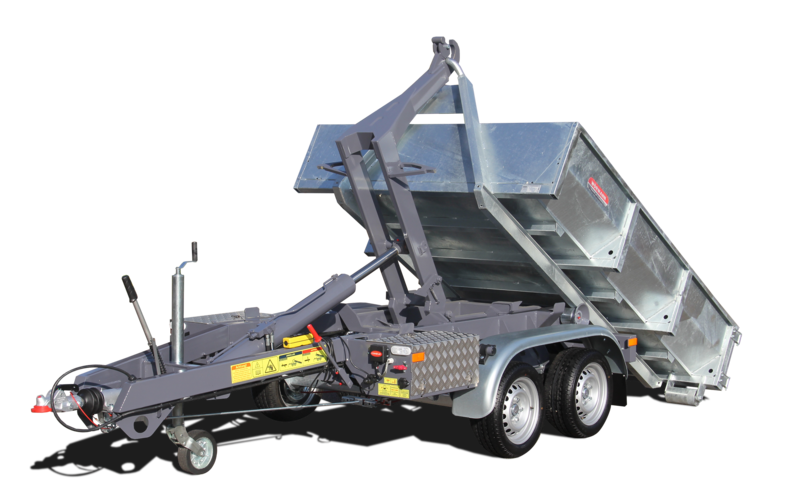
Cut Off
Detaching
Fishtailing
Load
Loose
Overturning
Size
Height
Width
Sliding
Trajectory
Wheels
☠️ Dangers related to trailers
Trailer Sway: Trailer sway occurs when the trailer begins to oscillate or sway from side to side, typically due to factors such as high speeds, improper loading, strong crosswinds, or sudden maneuvers. Trailer sway can cause the driver to lose control of the towing vehicle, leading to accidents or rollovers. Overloading: Overloading a trailer beyond its maximum weight capacity can result in various hazards. It can strain the trailer's tires, suspension, and braking system, potentially leading to tire blowouts, reduced braking effectiveness, or even structural failures. Overloaded trailers are also more challenging to control and can affect the stability and handling of the towing vehicle. Insufficient Load Securement: Improperly secured cargo on a trailer can shift during transit, leading to loss of control, accidents, or cargo spills. Unsecured or improperly secured loads can also create hazards for other road users if they fall off the trailer, obstruct the roadway, or cause collisions. Reduced Visibility: The length and height of trailers can obstruct the driver's rearward visibility, making it harder to see surrounding vehicles, pedestrians, or potential hazards. This limited visibility can increase the risk of collisions when changing lanes, merging, or maneuvering in congested areas. Extended Stopping Distance: Trailers increase the overall weight and length of the towing vehicle, which can significantly increase the stopping distance. This means that it takes longer for the driver to bring the vehicle and trailer to a complete stop, especially at high speeds or in emergency situations. Inadequate braking distance can result in rear-end collisions or difficulty stopping in time to avoid accidents. Backing and Turning Challenges: Trailers can be difficult to maneuver, particularly when reversing or making sharp turns. The driver needs to account for the trailer's pivot point, the extended length, and the potential for jackknifing. Inexperienced or improper backing and turning techniques can result in collisions, property damage, or injury to bystanders. Maintenance Issues: Trailers, like any other vehicles, require regular maintenance and inspections to ensure their roadworthiness. Neglecting maintenance tasks, such as checking tires, brakes, lights, and hitch connections, can lead to equipment failures, tire blowouts, or trailer detachment while in transit.
💡 Tips when towing a trailer
Check Weight Limits: Before towing a trailer, ensure that your towing vehicle is rated to handle the weight of the trailer and its cargo. Exceeding the weight limits can strain your vehicle's engine, transmission, suspension, and braking system, compromising safety and performance. Balance the Load: Properly distribute the weight of the cargo within the trailer. Aim for a balanced load with slightly more weight towards the front of the trailer, ahead of the trailer's axle(s). Avoid overloading one side or having excessive weight at the rear, as it can lead to instability and trailer sway. Secure the Load: Make sure that all cargo is securely fastened and properly tied down within the trailer. Use high-quality straps, ropes, or cargo nets to prevent shifting or falling of the load during transit. Double-check the load's security before setting off and periodically inspect it during stops. Hitching and Coupling: Ensure that the trailer hitch is compatible with your towing vehicle and properly secured. Follow the manufacturer's guidelines for hitching and coupling, including using safety chains or cables to provide an additional connection between the trailer and towing vehicle. Adjust Mirrors: Adjust your vehicle's mirrors to provide a clear view of the trailer and its surroundings. This will help you monitor traffic, change lanes safely, and be aware of any potential issues with the trailer during your journey. Allow for Extra Braking Distance: Recognize that towing a trailer increases your vehicle's overall weight, requiring additional distance to stop. Increase your following distance and allow for extra braking time to ensure a safe and controlled stop. Practice Maneuvering: Get familiar with the handling characteristics of the trailer by practicing turns, backing up, and parking in an open area before embarking on a trip. Be cautious when making turns, as the trailer's wider turning radius may require additional space. Monitor Tire Pressure: Regularly check the tire pressure of both your towing vehicle and the trailer. Underinflated or overinflated tires can affect stability, tire wear, and fuel efficiency. Follow the recommended tire pressure specifications for your specific towing setup. Be Mindful of Wind and Weather Conditions: Strong winds can have a significant impact on towing stability. Exercise caution and reduce speed when encountering gusty conditions. Similarly, be aware of how weather conditions, such as rain, snow, or ice, can affect traction and stopping distances. Take Breaks and Stay Alert: Long-distance towing can be tiring, so take regular breaks to rest and stretch. Stay alert and focused on the road, as towing requires extra attention and concentration.
🛈 Why trailers sway
Improper Weight Distribution: Unevenly distributed weight within the trailer can lead to imbalance and sway. If a trailer has too much weight towards the rear, it can cause the trailer to sway back and forth. It's important to load the trailer with a balanced distribution of weight, placing slightly more weight towards the front or ahead of the trailer's axle(s) to improve stability. Wind and Weather Conditions: Strong crosswinds or gusts can exert lateral forces on the trailer, causing it to sway. Wind hitting the broadside of the trailer can create a lifting effect, especially on tall or high-profile trailers, further contributing to sway. Adverse weather conditions, such as storms or heavy rain, can also affect stability and increase the risk of sway. Speed and Driving Habits: Traveling at high speeds can amplify the potential for trailer sway. Rapid acceleration or sudden braking can also initiate sway. Aggressive or abrupt steering maneuvers can destabilize the trailer and contribute to sway. It's important to drive within safe speed limits, maintain a consistent speed, and avoid sudden maneuvers. Improper Tire Pressure: Insufficient tire pressure or uneven tire inflation can impact the trailer's stability. Underinflated tires may overheat and flex excessively, leading to sway. Proper tire maintenance, including regular inspections and maintaining correct tire pressure, is crucial for safe towing. Insufficient Trailer Tongue Weight: The tongue weight refers to the downward force exerted on the hitch by the trailer. Insufficient tongue weight can result in unstable towing, as it reduces the amount of weight pressing down on the hitch, causing the trailer to sway. Maintaining the recommended tongue weight, typically around 10-15% of the trailer's total weight, helps promote stability. Suspension and Hitch Issues: Worn-out or inadequate suspension components can contribute to trailer sway. A loose or improperly installed hitch can also lead to instability. Regular maintenance and inspections of the trailer's suspension system and hitch are important to ensure they are in proper working condition. Inexperienced Towing or Improper Setup: Inexperienced drivers may not be familiar with proper towing techniques, including weight distribution, hitching, and driving habits. Incorrect setup, such as using an incompatible hitch or not securing the load properly, can also increase the risk of sway.
